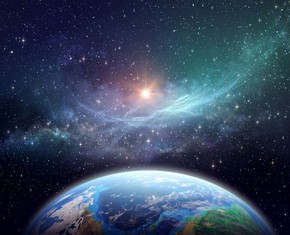The views expressed in our content reflect individual perspectives and do not represent the authoritative views of the Baha'i Faith.
Is this universe we live in a hospitable or an inhospitable one? Obviously, we live here—so it must be hospitable in at least some ways, or we would have to consider life miraculous.
In response to my series on a debate of the motion that ”Science Refutes God” a reader asked further questions about life in the universe that I felt compelled to answer. One such question was: Did I understand what physicist and atheist Lawrence Krauss meant in discussing whether the universe is hospitable or inhospitable?
This idea of whether the universe we live in is fine-tuned for life (hospitable) or not, came up in the course of the Intelligence Squared debate. My reader, whom I’ve dubbed Marty, wrote: “I am not sure if you quite get what is meant by that statement. … This is something we have ‘knowledge’ of as best as we can because while we cannot see individual planets we can see the general universe.”
Whatever physicist Lawrence Krauss’s statement actually implies about the nature of the universe, he was using the concept of a hospitable universe as a measure of the likelihood of life appearing on other worlds, and he was trying to have it both ways. He suggested that his opponents:
…. will argue the universe is equally fine-tuned for life … they will point out that certain fundamental parameters in nature, if they were different, we couldn’t exist. … This too is an illusion. … We would be quite surprised to find ourselves living in a universe in which we couldn’t live. In fact, that might be evidence for God.” (italics added)
This seems to suggest Krauss believes the universe is hospitable to life, to his mind, making God unnecessary. Does he? Let’s follow Dr. Krauss’s logic once more:
First, he argues that his opponents might invoke the universe being fine-tuned for life as evidence for God.
- He then argues that if it is not fine-tuned for life, life would be a miracle and, therefore, evidence for God.
- Then, he states that it is not fine-tuned for life, but “inhospitable to life” (which implies a miracle has occurred and that we ought to be surprised that we are here at all).
In other words, he argues that an inhospitable universe is an argument for God and that we do, indeed, live in an inhospitable universe. This raises the question of how both an hospitable and inhospitable universe can equally be taken as evidence against God. It also begs the question (in the literal, not scientific sense) as to why Krauss does not pause to reflect on what he previously said about the alleged miracle of our existence. He doesn’t speak to why he believes an intervention is evidence for God, while an ordered set of physical laws is not, but that’s a different discussion.
To Marty’s point: I wasn’t arguing Krauss’s science; I was arguing his logic.
Our reader Marty next made a startling assertion that I felt merited a response. He said “We know most of the universe.”
I know of no professional scientists who would agree with that assertion—and with good reason. We know something about the observable universe. But what is observable changes as we find new ways to look at it. For example, photographs taken of apparently empty regions of space using the visible spectrum become populated by solid-looking structures when photographed using different optics. To say we know most of the universe is to assume that 1) we have observed most of the universe and 2) the universe is made up of things we can see in some way and measure. Perhaps Marty didn’t mean that in the way I read it, but it is a fact that we can only safely say that we know some things about the parts of the universe we can observe and measure, and infer things about the parts of the universe we cannot observe and measure.
The Baha’i teachings point out that all natural phenomena—plants, animals, the stars themselves—are captives of the natural world and natural law:
All creation below the kingdom of man is the captive of nature; it cannot deviate in the slightest degree from nature’s laws. – Abdu’l-Baha, The Promulgation of Universal Peace, p. 241.
The colossal sun, center of our planetary system, is nature’s captive, incapable of the least variation from the law of command. All the orbs and luminaries in this illimitable universe are, likewise, obedient to nature’s regulation. – Ibid., p. 351.
In many ways, the universe we know is a function of that natural law—and only humans can attempt to understand and transcend it.
















Comments
Sign in or create an account
Continue with Googleor